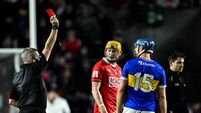Not even Charlie could help Ben with a non-existent tax problem
That was a politically reckless act for somebody in his position because it inevitably exposed him to inference of impropriety even if there was none.
This was one of the conclusions of Judge Brian McCracken in his tribunal report, which was a devastating indictment of Haughey. The judge made little effort to hide his annoyance at the way Haughey had prevaricated and lied to the tribunal. McCracken stopped short of accusing the former Taoiseach of perjury, or obstructing the tribunal, but there was little doubt he believed the Short Fellow was guilty of such behaviour.














